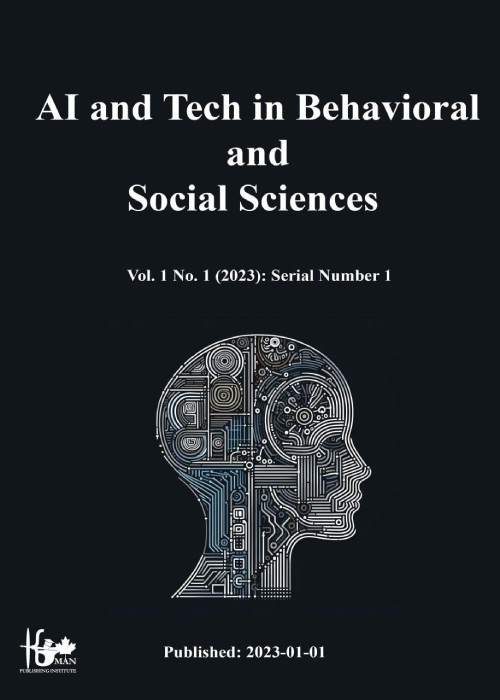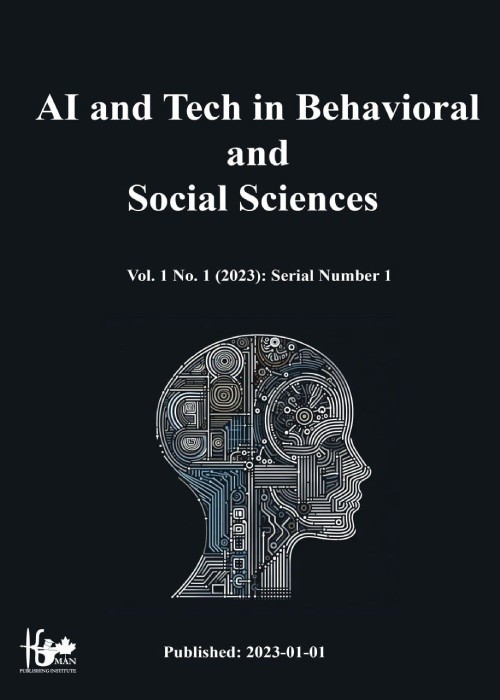فهرست مطالب

AI and Tech in Behavioral and Social Sciences
Volume:1 Issue: 1, Winter 2023
- تاریخ انتشار: 1402/01/06
- تعداد عناوین: 6
-
-
Pages 1-3
In the realm of contemporary research, the fusion of artificial intelligence (AI) and social sciences stands as a beacon of interdisciplinary innovation, driving forward our understanding of technology's multifaceted impact on society. This integration, is not just a parallel growth of two fields but a necessary convergence that illuminates the societal ramifications of AI advancements. The exploration of AI's expected impacts through social science inquiries is pivotal, offering a lens to view AI's societal roles with greater clarity and depth. As we launch the inaugural issue of "AI and Tech in Behavioral and Social Sciences," our commitment is to forge a path for groundbreaking research that spans these diverse yet interconnected domains. Through this journal, we aspire to cultivate a rich discourse that not only advances scientific knowledge but also contributes to the ethical, inclusive, and socially responsible development of AI technologies. Our journey begins with a deep belief in the power of interdisciplinary research to illuminate the complexities of human behavior and societal transformation in the age of AI.
Keywords: Artificial Intelligence, Technology, Behavioral Sciences, Social Sciences -
Pages 4-11
This article seeks to understand athletes' perceptions and experiences with AI-driven coaching technologies. The objective is to identify the major themes associated with the adoption, perceived benefits, challenges, and impact of these technologies on motivation and performance, alongside suggestions for future enhancements. Eighteen athletes across various sports disciplines participated in semi-structured interviews. The study employed a thematic analysis approach to identify key themes and sub-themes related to athletes' experiences with AI-driven coaching technologies. Ethical approval was obtained from the Institutional Review Board, and informed consent was secured from all participants. Five major themes were identified: Adoption and Adaptation, Perceived Benefits, Challenges and Limitations, Impact on Motivation and Performance, and Suggestions for Improvement. Athletes expressed initial skepticism followed by appreciation for the personalized training and efficiency offered by AI technologies. However, concerns regarding technical issues, lack of personal touch, and data privacy were noted. The impact on motivation and performance was predominantly positive, with athletes acknowledging the role of AI in enhancing training outcomes. Suggestions for improvement emphasized the need for more intuitive user interfaces, enhanced data security, and better integration of human coaching elements. Athletes recognize the transformative potential of AI-driven coaching technologies in enhancing training efficiency, personalization, and injury prevention. Nonetheless, the successful adoption of these technologies hinges on addressing technical challenges, ensuring data privacy, and maintaining the human element in coaching. Future developments in AI-driven coaching technologies should consider athletes' feedback to refine and tailor these tools, ensuring they meet the unique needs of individuals and foster a productive coach-athlete relationship. Suggestions for future research include expanding the participant pool across a wider range of sports and incorporating longitudinal studies to explore the evolution of athlete perspectives over time.
Keywords: Artificial Intelligence, AI-Driven Coaching, Technology, Coaching, Sports Sciences -
Pages 12-19
This study aimed to explore the challenges, opportunities, and support needs related to e-health literacy among older adults. By identifying these key areas, the study seeks to inform the development of targeted interventions and resources to enhance e-health literacy within this demographic. A qualitative research design was employed, involving semi-structured interviews with 16 older adults who have interacted with e-health platforms in the past year. Participants were purposively selected to ensure a diverse range of experiences. Data were analyzed using thematic analysis to identify major and minor themes related to e-health literacy challenges, opportunities, and support needs. The analysis revealed three major themes: Challenges, Opportunities, and Support Needs. Under Challenges, participants identified Technological Barriers, Health Literacy Issues, Accessibility Concerns, and Privacy and Security Fears. Opportunities highlighted were Enhanced Access to Health Information, Improved Patient-Provider Communication, and Personal Health Management. For Support Needs, the study found a demand for Educational Programs, Technical Assistance, and Customizable E-Health Tools. These findings underscore the multifaceted nature of e-health literacy among older adults and the need for comprehensive support mechanisms. Older adults face significant barriers to fully leveraging e-health resources, yet there exist substantial opportunities to enhance their e-health literacy through targeted support and interventions. Addressing the identified challenges and support needs can lead to improved health outcomes for older adults by facilitating more effective use of digital health platforms. The study underscores the importance of developing tailored e-health literacy resources that consider the unique circumstances and preferences of older adults.
Keywords: E-health Literacy, Older Adults, Challenges, Opportunities, Support Needs -
Pages 20-26
This study aims to explore social media users' perspectives on privacy concerns and data sharing, identifying the major themes that encapsulate their experiences and attitudes towards online privacy and the strategies they employ to protect their personal information. A qualitative research design was employed, involving semi-structured interviews with 23 social media users from diverse demographic backgrounds. Thematic analysis was used to analyze the interview transcripts, focusing on identifying and interpreting patterns related to privacy concerns and protective behaviors. The analysis revealed five major themes: Understanding of Privacy, Attitudes Towards Data Sharing, Privacy Management Strategies, Impact of Social Media on Privacy, and Future Perspectives on Privacy. Each theme comprised several categories and concepts, including Definitions of Privacy, Privacy Awareness, Willingness to Share, Risks and Benefits, Use of Privacy Settings, Information Disclosure, Avoidance Behaviors, Perceived Threats, Changes in Behavior, Desired Changes, Predictions about Privacy, and User Empowerment. The study highlights the complex and multifaceted nature of social media users' privacy concerns and the strategies they adopt to navigate these challenges. It underscores the importance of developing more intuitive privacy controls and the need for ongoing education on privacy management. The findings also suggest a call for social media platforms and policymakers to consider users' diverse needs and concerns in the development of privacy protection measures.
Keywords: Social Media, Privacy Concerns, Data Sharing, Protective Behaviors, User Perspectives, Thematic Analysis, Privacy Management Strategies -
Pages 27-34
The objective of this study is to investigate the dynamics of digital intimacy, including how individuals use digital platforms to initiate, maintain, and navigate their personal relationships. It seeks to identify the main themes related to digital intimacy, the challenges and benefits associated with it, and the strategies individuals employ to manage their digital relationships. Employing a qualitative research design, this study conducted semi-structured interviews with 28 participants divided into two groups: individuals involved in digital relationships and professionals in the fields of psychology, sociology, and technology. The interviews were analyzed using thematic analysis to identify key themes and categories related to digital intimacy. The study identified seven main themes associated with digital intimacy: Formation of Digital Intimacy, Maintenance of Relationships, Challenges of Digital Intimacy, Benefits of Digital Intimacy, Navigating Digital and Offline Worlds, Evolution of Digital Intimacy, and Characteristics of Digital Intimacy. These themes encompass various aspects of digital relationships, including the initiation and maintenance processes, the role of digital platforms in facilitating emotional connections, and the challenges of privacy, security, and miscommunication. Digital intimacy plays a significant role in shaping modern friendships and romantic relationships, offering both opportunities and challenges. While digital platforms facilitate the formation and maintenance of connections across distances, they also introduce complexities in communication, privacy, and the integration of digital and offline lives. Understanding these dynamics is essential for individuals and professionals working to navigate the digital landscape of personal relationships.
Keywords: Digital Intimacy, Personal Relationships, Online Communication, Social Media, Privacy -
Pages 35-42
This study aims to investigate teachers' attitudes towards AI in education, focusing on identifying the perceived benefits, challenges, and ethical considerations associated with AI integration into teaching and learning environments. Utilizing a qualitative research design, this study conducted semi-structured interviews with 28 educators from various educational levels and disciplines. Thematic analysis was employed to analyze the interview data, identifying key themes and concepts related to teachers' perspectives on AI in education. Four main themes were identified: Pedagogical Impacts, Ethical and Social Considerations, Technological Challenges and Opportunities, and Perceptions of AI in Education. Pedagogical Impacts encompassed enhancing learning outcomes, curriculum integration, and the evolving roles of teachers. Ethical and Social Considerations highlighted concerns over data privacy, bias, and equity. Technological Challenges and Opportunities discussed integration challenges and the future of educational technology. Lastly, Perceptions of AI in Education revealed varied attitudes, awareness levels, and perceived impacts on professional identity. Teachers recognize the transformative potential of AI in enhancing personalized learning and operational efficiency. However, concerns about ethical issues, technological infrastructure, and the need for professional development are significant. Addressing these concerns requires targeted efforts from policymakers, educational leaders, and technologists to foster a supportive environment for AI integration in education.
Keywords: Artificial Intelligence, Education, Teacher Attitudes, Pedagogical Practices, Ethical Considerations, Technological Integration


